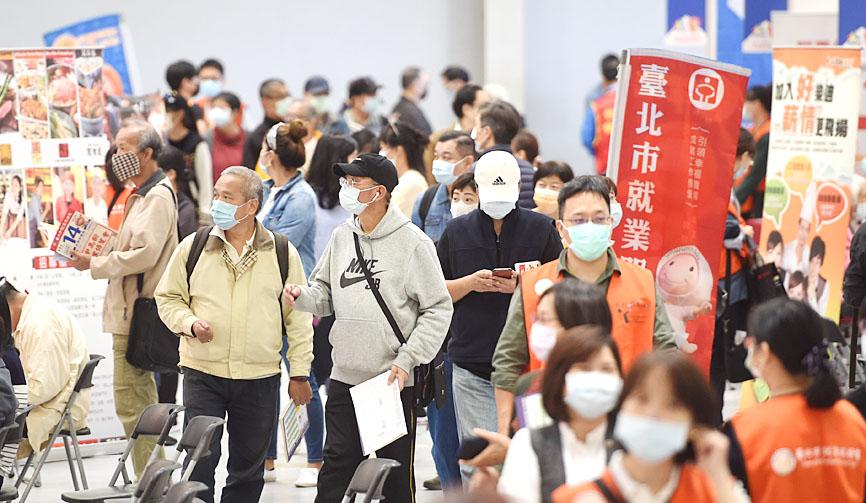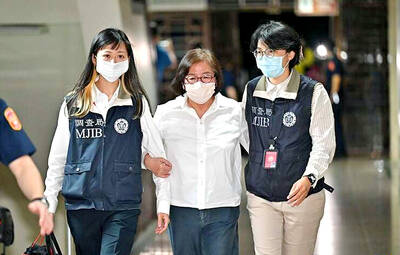Taiwan is projected to become a super-aged society by 2025, and already its rapidly aging population has created gaps in the workforce, the Directorate-General of Budget, Accounting and Statistics (DGBAS) said.
The labor participation rate of people aged 50 or older is significantly lower than that of Japan, South Korea and the US, despite an annual rise in the participation rate of late-middle-aged workers over the past decade, the agency said.
The labor participation rate among those aged 45 to 49 in Japan was 88.5 percent last year, followed by 84.7 percent in Taiwan, the US’ 83 percent and South Korea’s 81.1 percent, Department of Census Deputy Director Chen Hui-hsin (陳惠欣) said on Nov. 8.

Photo: Liu Hsin-de, Taipei Times
The participation rate among workers aged 65 or older was even lower than the 50-or-older group at only 8.32 percent, Chen said.
Previously, the late-middle-aged participation rate was lower due to the prevalence of higher education, which delays the time for people to enter the job market, she said.
Although the situation has improved over the past decade, the rate was still lower than other major economies, she said, adding that a higher retirement age was also a factor.
A breakdown of the participation rates of different demographics over the past 10 years shows that the male late-middle-aged group had negative growth in the first few years, before rising to 76.5 percent last year, 0.8 percent higher than in 2009, she said.
The female participation rate in the same age group grew every year during the period, reaching a peak of 51.1 percent last year, 5.9 percent higher than in 2009, she said.
The difference between the participation rates of male and female workers has narrowed from 30.5 percent in 2009 to 25.3 percent last year, Chen said.
The participation rates among men and women aged 45 to 64 are 76.3 percent and 52.2 percent respectively this year, with a difference of only 24.1 percent, a new low, she added.
In the 45-to-49 age group, the participation rate among men and women this year was 95.1 percent and 74.8 percent respectively, she said.
The rate was 74.4 percent among people aged 50 to 54, while the rates among males and females was 87.9 percent and 61.5 percent respectively, she said.
The 55-to-59 age group had a participation rate of 56.1 percent, with male and female rates of 70.4 percent and 42.4 percent respectively, she said.
The participation rate among people aged 60 to 64 was 36.7 percent, with male and female rates of 50.2 percent and 24.1 percent respectively, she added.
Compared with 2009, the participation rate in each age group increased last year, particularly among males aged 50 to 54, which saw an increase of 6.3 percent, and among females aged 45 to 49 and 50 to 64, both of which increased by 11.9 percent, said a DGBAS official, who declined to be named.
The older the age group, the wider the difference in its participation rate compared with major economies, the official said, citing the 36.7 percent participation among people aged 60 to 64, which was 71.9 percent in Japan, 62.1 percent in South Korea and 57.5 percent in the US.
The difference in the participation rates between males and females in each age group ranges from 20.3 percent to 28 percent in Taiwan, close to South Korea’s 20.8 percent to 24.2 percent, but higher than the US’ 11.6 percent to 11.9 percent and Japan’s 14.5 percent to 24.7 percent, the official said.
The Ministry of Labor has rolled out economic incentives for business owners to hire late-middle-aged workers under the Act to Promote the Employment of Middle-aged and Senior Workers (中高齡及高齡者就業促進法).
The act, which cleared its third reading at the Legislative Yuan in November last year, prohibits employers from discriminating against older people when hiring or evaluating their performance. It also prohibits differential treatment, such as salary levels or company benefits, based on a person’s age.
Employers who hire unemployed people aged 45 to 65 could qualify for a monthly subsidy of NT$13,000 per person for 12 months under the act.
Ministry official Shih Shu-hui (施淑惠) said that while some are concerned that the act would eliminate job opportunities for younger people, the ministry believes that younger people should not compete with older people in the job market, but instead cooperate.
Policy tools to assist young people in finding jobs are also in place, Shih said, adding that different generations can learn from each other.
Additional reporting by Lee Ya-wen

Costa Rica sent a group of intelligence officials to Taiwan for a short-term training program, the first time the Central American country has done so since the countries ended official diplomatic relations in 2007, a Costa Rican media outlet reported last week. Five officials from the Costa Rican Directorate of Intelligence and Security last month spent 23 days in Taipei undergoing a series of training sessions focused on national security, La Nacion reported on Friday, quoting unnamed sources. The Costa Rican government has not confirmed the report. The Chinese embassy in Costa Rica protested the news, saying in a statement issued the same

Taiwan is to extend its visa-waiver program for Philippine passport holders for another year, starting on Aug. 1, Minister of Foreign Affairs Lin Chia-lung (林佳龍) said on Friday. Lin made the announcement during a reception in Taipei marking the 127th anniversary of Philippine independence and the 50th anniversary of the establishment of the Manila Economic and Cultural Office (MECO) in Taiwan, the Ministry of Foreign Affairs said. The decision reflected Taiwan’s commitment to deepening exchanges with the Philippines, the statement cited Lin as saying, adding that it was a key partner under the New Southbound Policy launched in 2016. Lin also expressed hope

Temperatures in New Taipei City’s Sindian District (新店) climbed past 37°C yesterday, as the Central Weather Administration (CWA) issued heat alerts for 16 municipalities, warning the public of intense heat expected across Taiwan. The hottest location in Taiwan was in Sindian, where the mercury reached 37.5°C at about 2pm, according to CWA data. Taipei’s Shilin District (士林) recorded a temperature of 37.4°C at noon, Taitung County’s Jinfeng Township (金峰) at 12:50 pm logged a temperature of 37.4°C and Miaoli County’s Toufen Township (頭份) reached 36.7°C at 11:40am, the CWA said. The weather agency yesterday issued a yellow level information notice for Taipei, New

CASE: Prosecutors have requested heavy sentences, citing a lack of remorse and the defendants’ role in ‘undermining the country’s democratic foundations’ Five people affiliated with the Chinese Nationalist Party (KMT), including senior staff from the party’s Taipei branch, were indicted yesterday for allegedly forging thousands of signatures to recall two Democratic Progressive Party (DPP) lawmakers. Those indicted include KMT Taipei chapter director Huang Lu Chin-ru (黃呂錦茹), secretary-general Chu Wen-ching (初文卿) and secretary Yao Fu-wen (姚富文), the Taipei District Prosecutors’ Office said in a news release. Prosecutors said the three were responsible for fabricating 5,211 signature forms — 2,537 related to the recall of DPP Legislator Wu Pei-yi (吳沛憶) and 2,674 for DPP Legislator Rosalia Wu (吳思瑤) — with forged entries accounting for